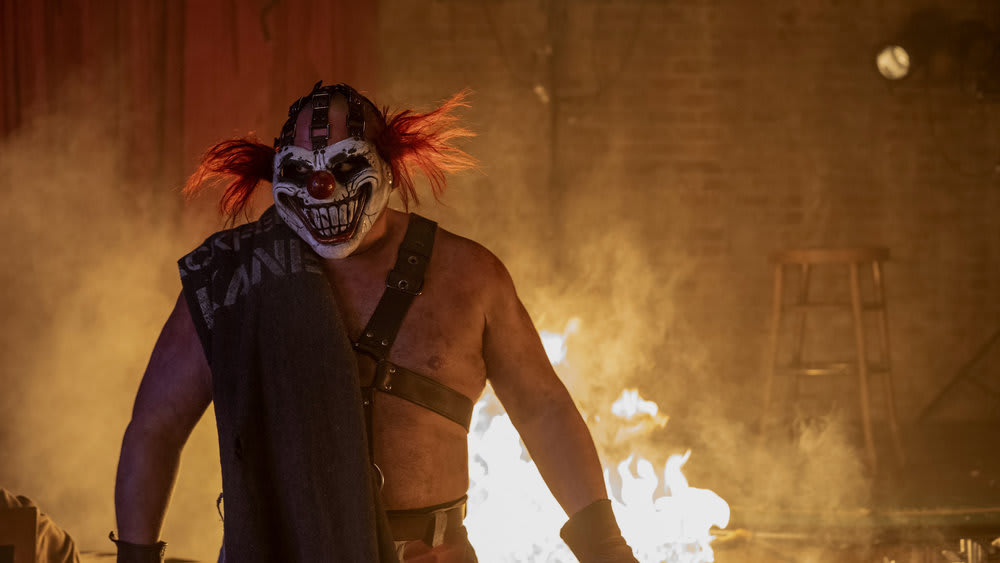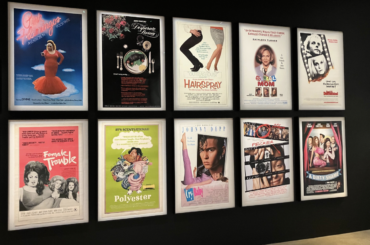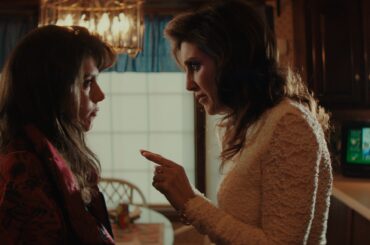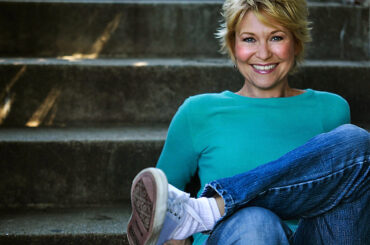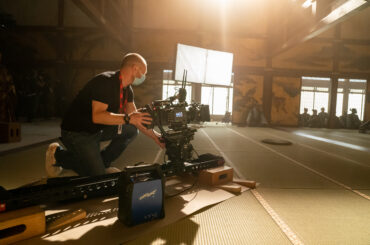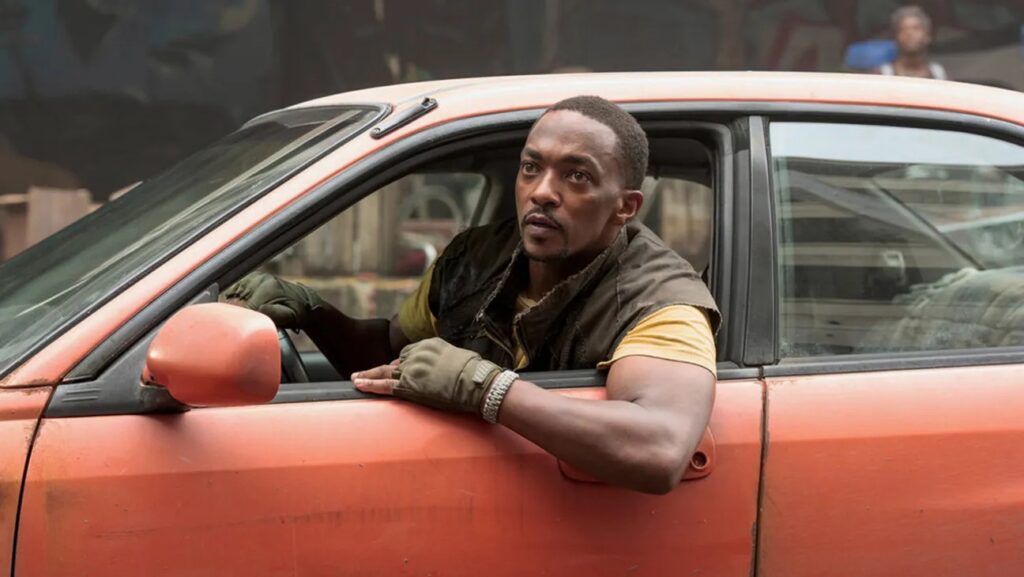
When you interview composers Leo Birenberg & Zach Robinson, one of the first thoughts is, This duo makes a lot of sense. Unless there’s a Hall & Oates situation going on behind-the-scenes, the two composers have a rapport that’s evident in both conversation and their eclectic scores. The Twisted Metal composers can go all over the place, musically, and yet tie it all together with a bow.
The Peacock series came to the Cobrai Kai duo almost 15 years after they first met in composer Christophe Beck‘s studio. “We were in the studio working on music collectively together,” Leo said. “Zach and I had some very good bonding time there, and so then when we spread our wings and left the nest, when some opportunities came up, we were like, ‘Hey, we should just do this together.’ Here we are.”
The music duo talked with Immersive Media about their variety of influences, their thundering drums, and what they hope to achieve in Twisted Metal season two.
What were some of the early ideas and influences for Twisted Metal?
Robinson: There were a few genres of music that MJ, the showrunner, had in mind. He threw out post-rock at us. Then we threw back at him this genre that we discovered called bootgaze, which is Shoegaze, but with a country western tinge. It’s a vibe we leaned into with a lot of country western-type sounds.
It takes place in the early 2000s when nu metal was popular, so we have a lot of Korn influence and Limp Bizkit, all that kind of stuff. It’s kind of all over the place. But then, as we tend to do with a lot of our scores, we somehow make it all feel cohesive, or at least we try to.
You definitely hear the Western influence. Zach, what exactly is that sub-genre you mentioned, Bootgaze?
Robinson: Bootgaze. So, you know what Shoegaze is?
No.
Robinson: Shoegaze is a genre of alt-rock that was kind of big. Sonic Youth is one of the earlier examples and Slowdive. It’s a reference to the fact that there are so many guitar pedals on the ground that the performers are always looking at their shoes. Did you know that, Leo?
Birenberg: I did know that.
Robinson: Yeah, it’s warble-y and ethereal with a lot of reverb and delay. And then bootgaze is instead of shoes, you got your country western boots.
Birenberg: Boots.
Robinson: You’re wearing boots.
Birenberg: Ideally with, what are they called on the backs? Spurs?
Robinson: Ideally with spurs.
We’re all ’90s kids here. Did you guys revisit that music, or is that music you revisit often anyway?
Birenberg: I feel like Zach is more of a pure Korn fan than I am.
Robinson: Honestly, my wife is a pure Korn fan. She’s actually got tickets to go see them without me in Vegas or something. Leo and I, we are just fans of music in general, honestly. Sounds silly to say, but we like a lot of different genres and we’re always really open.
Part of the fun that we have together is we think of an out-there idea, or one of us found something on Spotify and we just send it. We’re like, “We should do a score like this.” Like Korn, it’s helpful when the showrunner has an idea like that, then you can just run with it. We were able to find some amazing musicians who play like that, who have that kind of Korn sound, and it was fun to implement the sound into the score. I don’t think that exists on other shows. Maybe it does, but I don’t know.
When you became professional composers, did how you both listen to music change? Limp Bizkit or Korn are groups some people like to trash, but is there a part of you that hears music often scoffed at differently?
Birenberg: Oh man, I won’t trash anybody if you’re actually recording records. That shit’s hard work. Yeah, it doesn’t matter who hates it. You know what, everyone hates Nickelback, but Nickelback’s released a lot of music. That was hard work.
As wild as the score sometimes it, and even as jokey as it can be, it’s also very sincere. For example, the death of John Doe’s car, Evelyn, that track really works. How exactly do you bring all those tones together?
Birenberg: That’s our thing, that’s our brand. The concepts are 12 out of 10, balls to the wall, but we always make the biggest priority hitting the emotional core of anything. It’s where you’re really connecting to the audience. I mean, Evelyn’s a fucking car, and when you’re watching it, you’re sobbing over this car. Then it gives you license for all the fun, crazy stuff, and you bought into the characters, therefore you are along for the ride. I think that translates to every single show and movie we do.
Robinson: And the audience can tell if it’s insincere. When I say, “Oh, we’re fans of music, and that sounds kind of silly,” this is kind of an example of where we feel that our genuine, authentic admiration for a lot of different types of music helps. It helps us to become better composers because we’re able to approach a scene, like the Astral Burger scene, all these different tribes of gangs and stuff, and we’re able to give each of them an authentic identity. We know where each of those sounds are coming from and what we’re referencing. It’s kind of always this wink and a nod. If you get it, you get it. I think it enriches the show for sure, at least for someone like me.
So, you’ve developed this brand of going hard and unabashed sincerity. Was that something along the way that people started saying about your music, or is it style you two always were going for?
Birenberg: Well, we like to go very hard if we go hard. We have no problem admitting that. We’re having the most fun when we write something that goes really hard. But I do think that everyone picks up on the sincerity thing because it comes up a lot. I don’t know if that’s how we became aware of it, but I think part of going hard is we also go hard in the feels department.
But what we very specifically do is we try to make sure that stuff is not parody. When you’re doing a comedy show and it’s got a crazy setting, when you do an emotional cue, sometimes you don’t want it to play down. It’s like a College Humor video or something, which I’ve scored dozens of, so I know all about that. You want it to feel like no matter what the context of the show is, those emotions are as genuine as possible.
A lot of world-building the score has to do. How did you want to define some of the different groups and characters we’re following?
Robinson: That was some of the most fun we had on the show, for sure. It was a part of the early discussions that we had with the producers. They were really excited about the Holy Men and the Trucker Vikings. Immediately you say those words and you know exactly what they’re going to sound like.
Birenberg: Totally.
Robinson: And so, then it becomes about the execution of that and how you can play with it. So, for instance, the Holy Men are these very religious zealots who are out in the desert. And for that, went to a lot of different stuff. We went to early Middle Eastern music and Eastern European music and tried to combine it all. And then, we have these voices that we are messing with a lot and doing these different chants. You hear it and it elicits a sound that you know.
Birenberg: That’s how the Holy Men became bootgaze.
Robinson: Yeah, that’s how the Holy Men became bootgaze. We get to be playful with that stuff. A fun mix of past and future in a lot of these ideas and tribes.
Making those wild choices, do you self-edit along the way or do you both throw everything into the kitchen sink first and go from there?
Robinson: I think the benefit of our partnership is that we can just rip and do what we want to do. Our process has always been very collaborative in the sense of I will write something, and then I’ll throw it over to Leo. He’ll do a couple of tweaks. We go back and forth and we let each other know what’s working. We think of it as a hive mind. It’s very singular in that sense, but we can throw each other ideas, and that’s the fun of working on the project. The point of view is singular because it’s both of our points of view, which is super helpful.
Birenberg: I don’t know if we like to self-edit, though. I feel like a lot of our best ideas are just like, what’s the wildest shit we could do in this scene right now? Can we pull it off? Sometimes it just doesn’t work and you pull back, but often it does.
If you guys return for season two, any themes you want to develop or ideas you want to double down on?
Robinson: We’re going to have so many new characters that they hinted at based on the last shot of the finale, but I don’t know. We’d have a lot of new characters and there was a cliffhanger. My assumption is that there would be more tribes and all these characters that are from the game that we didn’t really get to meet at all.
Birenberg: Whenever you hit season two in a show, the leash comes off a little bit in terms of you don’t have to find that. You don’t have to find the sound anymore, and you have themes established. So instead, you just hit the ground running.
I would anticipate that everything we write is ten times crazier than season one. Yeah. It says a lot. Now we know because you know what you can get away with and how much crazy the onscreen story can support. With a show like Twisted Metal, that threshold’s really freaking high, so we can do anything.
Twisted Metal is available to stream on Peacock.


